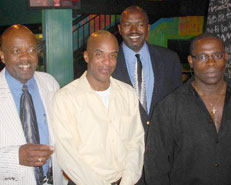In Focus: Eyewitness Misidentification
10.21.08
Eyewitness misidentification is by far the leading cause of wrongful convictions. Nationwide, 75% of wrongful convictions that were overturned by DNA testing involved erroneous identifications from victims or witnesses.
Decades of solid scientific research, combined with a growing body of real-world experience, show that eyewitness identification is often fallible. Simple reforms have been proven to increase the accuracy of identifications. Several exonerations in recent months have highlighted the unreliability of eyewitness testimony, but a Georgia man, Troy Davis sits on Georgia's death row despite the unreliable eyewitness identifications used to convict him.
The Troy Davis Case

Nearly two decades ago, a Savannah, Georgia, police officer was killed in a restaurant parking lot. Troy Davis (left) was arrested for the crime, and nine non-police eyewitnesses testified that they saw him shoot the victim. Based almost exclusively on eyewitness testimony, Davis was convicted of the murder and sentenced to death. Since his conviction, several eyewitnesses have recanted, but their words haven’t helped Davis win any appeals.
Three times, he has come within days or hours of execution before receiving a stay. Last month, the U.S. Supreme Court granted a temporary stay just two hours before a scheduled execution. The Court then declined last week to hear arguments in Davis’ case. But on October 24, a federal court granted another stay in his case.
Davis has been unable to get a hearing in court because of an arbitrary and extreme Georgia law which bars most recantation evidence on appeal. Innocence Project Co-Director Barry Scheck wrote about this critical issue in on the
Huffington Post on October 24
.
Read more about his case here
.
Dallas: The Exonerations Tell the Story

Left: Four men exonerated by DNA testing in Dallas after being misidentified and wrongfully convicted. (From left to right: James Giles, Thomas McGowan, James Waller and Charles Chatman)
Twenty-one people have been cleared by DNA testing in Dallas County since 2001, more than in any other county in the nation in that timeframe. All but two of the 21 people cleared by DNA testing were convicted based, at least in part, on eyewitness misidentification.
The Dallas Morning News focused on the problem of eyewitness identification in a groundbreaking investigative series this month, covering problems with photo lineups, “show-up” identifications and other police procedures. The series also outlined reforms that could prevent injustice in future cases.
Read the Dallas Morning News series here, and watch video with several Dallas exonerees
.
Based on decades of social science research and the growing number of wrongful convictions overturned by DNA testing, the Innocence Project has developed a set of recommendations to improve identification procedures currently used by law enforcement agencies across the country.
Learn about these recommendations here
.

Leave a Reply
Thank you for visiting us. You can learn more about how we consider cases here. Please avoid sharing any personal information in the comments below and join us in making this a hate-speech free and safe space for everyone.